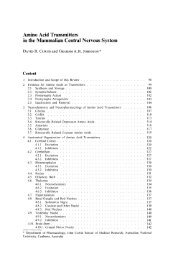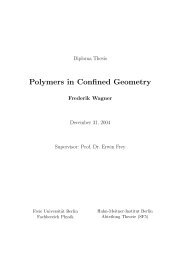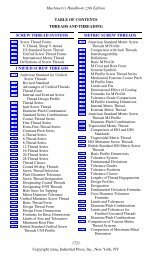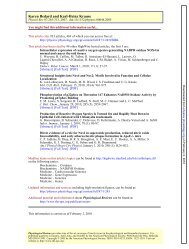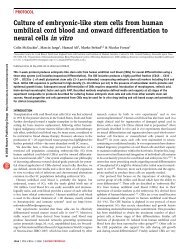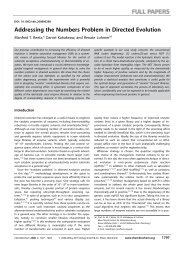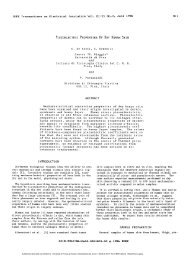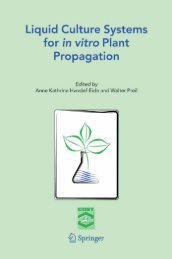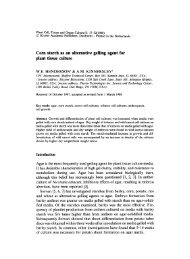- Page 2 and 3:
PROTOCOLS FOR MICROPROPAGATION OF W
- Page 4 and 5:
A C.I.P. Catalogue record for this
- Page 6 and 7:
vi TABLE OF CONTENTS 14. Root induc
- Page 8 and 9:
viii TABLE OF CONTENTS 43. Micropro
- Page 10 and 11:
x PREFACE on precise stepwise proto
- Page 12 and 13:
CHAPTER 1 TOTIPOTENCY AND THE CELL
- Page 14 and 15:
TOTIPOTENCY AND THE CELL CYCLE 5 a
- Page 16 and 17:
2.2. Plant Bioregulators and the Ce
- Page 18 and 19:
TOTIPOTENCY AND THE CELL CYCLE 9 in
- Page 20 and 21:
TOTIPOTENCY AND THE CELL CYCLE 11 F
- Page 22 and 23:
Bartel, D. (2004) MicroRNAs: genomi
- Page 24 and 25:
CHAPTER 2 MICROPROPAGATION VIA ORGA
- Page 26 and 27:
MICROPROPAGATION OF SLASH PINE Tabl
- Page 28 and 29:
MICROPROPAGATION OF SLASH PINE Amon
- Page 30 and 31:
2.6. Field Testing MICROPROPAGATION
- Page 32 and 33:
CHAPTER 3 MICROPROPAGATION OF COAST
- Page 34 and 35:
MICROPROPAGATION OF SEQUOIA SEMPERV
- Page 36 and 37:
MICROPROPAGATION OF SEQUOIA SEMPERV
- Page 38 and 39:
MICROPROPAGATION OF SEQUOIA SEMPERV
- Page 40 and 41:
MICROPROPAGATION OF SEQUOIA SEMPERV
- Page 42 and 43:
CHAPTER 4 MICROPROPAGATION OF PINUS
- Page 44 and 45:
MICROPROPAGATION OF PINUS PINEA L.
- Page 46 and 47:
MICROPROPAGATION OF PINUS PINEA L.
- Page 48 and 49:
MICROPROPAGATION OF PINUS PINEA L.
- Page 50 and 51:
42 2.1. Organ Culture K. ISHII ET A
- Page 52 and 53:
44 K. ISHII ET AL. scent light, 70
- Page 54 and 55:
46 Chemicals (mg/l) K. ISHII ET AL.
- Page 56 and 57:
48 Table 3. Effects of plant growth
- Page 58 and 59:
50 K. ISHII ET AL. Gupta, P.K. & Du
- Page 60 and 61:
52 C. HARGREAVES AND M. MENZIES (Me
- Page 62 and 63:
54 C. HARGREAVES AND M. MENZIES Con
- Page 64 and 65:
56 2.1.3. Organogenesis from Field-
- Page 66 and 67:
58 C. HARGREAVES AND M. MENZIES Fig
- Page 68 and 69:
60 C. HARGREAVES AND M. MENZIES Fig
- Page 70 and 71:
62 C. HARGREAVES AND M. MENZIES For
- Page 72 and 73:
64 C. HARGREAVES AND M. MENZIES and
- Page 74 and 75:
CHAPTER 7 GENETIC FIDELITY ANALYSES
- Page 76 and 77:
PLANT GENETIC FIDELITY 69 Plant mat
- Page 78 and 79:
e added to samples, as this fluoroc
- Page 80 and 81:
11. Determine the mean channel numb
- Page 82 and 83:
3. In addition to testing various b
- Page 84 and 85:
GeneScan internal size standards: 4
- Page 86 and 87:
3500 3000 2500 2000 1500 1000 500 0
- Page 88 and 89:
PLANT GENETIC FIDELITY 81 microprop
- Page 90 and 91:
PLANT GENETIC FIDELITY 83 Steinkell
- Page 92 and 93:
86 2.1. Explant Preparation M.G. OS
- Page 94 and 95:
88 WPM (Lloyd & McCown, 1980) Macro
- Page 96 and 97:
90 M.G. OSTROLUCKÁ ET AL. on the m
- Page 98 and 99:
CHAPTER 9 MICROPROPAGATION OF MEDIT
- Page 100 and 101:
2.1. Explant Preparation MICROPROPA
- Page 102 and 103:
MICROPROPAGATION OF MEDITERRANEAN C
- Page 104 and 105:
MICROPROPAGATION OF MEDITERRANEAN C
- Page 106 and 107:
MICROPROPAGATION OF MEDITERRANEAN C
- Page 108 and 109:
MICROPROPAGATION OF MEDITERRANEAN C
- Page 110 and 111:
MICROPROPAGATION OF MEDITERRANEAN C
- Page 112 and 113:
108 D.T. NHUT ET AL. Larue (1953) a
- Page 114 and 115:
110 D.T. NHUT ET AL. HgCl2 added wi
- Page 116 and 117:
112 2.4. Establishment of Shoot Cul
- Page 118 and 119:
114 D.T. NHUT ET AL. Table 5. Effec
- Page 120 and 121:
116 D.T. NHUT ET AL. culture to be
- Page 122 and 123:
118 D. EWALD ability of the plant m
- Page 124 and 125:
120 D. EWALD Figure 1. Yew micropro
- Page 126 and 127:
122 D. EWALD Root development. Afte
- Page 128 and 129:
CHAPTER 12 MICROPROPAGATION OF LARI
- Page 130 and 131:
MICROPROPAGATION OF LARIX SPECIES V
- Page 132 and 133:
MICROPROPAGATION OF LARIX SPECIES V
- Page 134 and 135:
MICROPROPAGATION OF LARIX SPECIES V
- Page 136 and 137:
MICROPROPAGATION OF LARIX SPECIES V
- Page 138 and 139:
MICROPROPAGATION OF LARIX SPECIES V
- Page 140 and 141:
CHAPTER 13 PROPAGATION OF SELECTED
- Page 142 and 143:
PROPAGATION OF SELECTED PINUS GENOT
- Page 144 and 145:
PROPAGATION OF SELECTED PINUS GENOT
- Page 146 and 147:
PROPAGATION OF SELECTED PINUS GENOT
- Page 148 and 149:
PROPAGATION OF SELECTED PINUS GENOT
- Page 150 and 151:
CHAPTER 14 ROOT INDUCTION OF PINUS
- Page 152 and 153:
ROOT INDUCTION OF PINUS SYLVESTRIS
- Page 154 and 155:
ROOT INDUCTION OF PINUS SYLVESTRIS
- Page 156 and 157:
CHAPTER 15 MICROPROPAGATION OF BETU
- Page 158 and 159:
MICROPROPAGATION OF BETULA PENDULA
- Page 160 and 161:
MICROPROPAGATION OF BETULA PENDULA
- Page 162 and 163:
MICROPROPAGATION OF BETULA PENDULA
- Page 164 and 165:
MICROPROPAGATION OF BETULA PENDULA
- Page 166 and 167:
CHAPTER 16 PROTOCOL FOR DOUBLED-HAP
- Page 168 and 169:
DOUBLED-HAPLOID MICROPROPAGATION IN
- Page 170 and 171:
DOUBLED-HAPLOID MICROPROPAGATION IN
- Page 172 and 173:
DOUBLED-HAPLOID MICROPROPAGATION IN
- Page 174 and 175:
DOUBLED-HAPLOID MICROPROPAGATION IN
- Page 176 and 177:
DOUBLED-HAPLOID MICROPROPAGATION IN
- Page 178 and 179:
DOUBLED-HAPLOID MICROPROPAGATION IN
- Page 180 and 181:
DOUBLED-HAPLOID MICROPROPAGATION IN
- Page 182 and 183:
CHAPTER 17 IN VITRO PROPAGATION OF
- Page 184 and 185:
IN VITRO PROPAGATION OF FRAXINUS SP
- Page 186 and 187:
IN VITRO PROPAGATION OF FRAXINUS SP
- Page 188 and 189:
Axillary shoots (number) IN VITRO P
- Page 190 and 191:
IN VITRO PROPAGATION OF FRAXINUS SP
- Page 192 and 193:
IN VITRO PROPAGATION OF FRAXINUS SP
- Page 194 and 195:
IN VITRO PROPAGATION OF FRAXINUS SP
- Page 196 and 197:
CHAPTER 18 MICROPROPAGATION OF BLAC
- Page 198 and 199:
MICROPROPAGATION OF BLACK LOCUST 19
- Page 200 and 201:
2.5. Rooting and Acclimatization MI
- Page 202 and 203:
MICROPROPAGATION OF BLACK LOCUST 19
- Page 204 and 205:
202 V. RAJESWARI AND K. PALIWAL tha
- Page 206 and 207:
204 V. RAJESWARI AND K. PALIWAL Mak
- Page 208 and 209:
206 V. RAJESWARI AND K. PALIWAL 2.3
- Page 210 and 211:
208 V. RAJESWARI AND K. PALIWAL Fig
- Page 212 and 213:
210 2.8. Hardening V. RAJESWARI AND
- Page 214 and 215:
CHAPTER 20 MICROPROPAGATION OF SALI
- Page 216 and 217:
MICROPROPAGATION OF SALIX CAPREA L.
- Page 218 and 219:
MICROPROPAGATION OF SALIX CAPREA L.
- Page 220 and 221:
MICROPROPAGATION OF SALIX CAPREA L.
- Page 222 and 223:
CHAPTER 21 MICROPROPAGATION OF CEDR
- Page 224 and 225:
2.1. Establishment of Shoot Culture
- Page 226 and 227:
MICROPROPAGATION OF CEDRELA FISSILI
- Page 228 and 229:
MICROPROPAGATION OF CEDRELA FISSILI
- Page 230 and 231:
MICROPROPAGATION OF CEDRELA FISSILI
- Page 232 and 233:
MICROPROPAGATION OF CEDRELA FISSILI
- Page 234 and 235:
MICROPROPAGATION OF CEDRELA FISSILI
- Page 236 and 237:
MICROPROPAGATION OF CEDRELA FISSILI
- Page 238 and 239:
238 programmes is somatic embryogen
- Page 240 and 241:
240 Figure 2. A) Induction of organ
- Page 242 and 243:
242 2.4.1. Rooting of Apical and Ba
- Page 244 and 245:
244 of donor individuals and/or by
- Page 246 and 247:
246 J. MALÀ ET AL. Karnosky, D.F.,
- Page 248 and 249:
CHAPTER 23 MICROGRAFTING IN GRAPEVI
- Page 250 and 251:
MICROGRAFTING IN GRAPEVINE 251 and
- Page 252 and 253:
MICROGRAFTING IN GRAPEVINE 253 Tabl
- Page 254 and 255:
2.4. Culture Conditions MICROGRAFTI
- Page 256 and 257:
MICROGRAFTING IN GRAPEVINE 257 Feuc
- Page 258 and 259:
CHAPTER 24 MICROGRAFTING GRAPEVINE
- Page 260 and 261:
MICROGRAFTING GRAPEVINE FOR VIRUS I
- Page 262 and 263:
MICROGRAFTING GRAPEVINE FOR VIRUS I
- Page 264 and 265:
MICROGRAFTING GRAPEVINE FOR VIRUS I
- Page 266 and 267:
CHAPTER 25 APRICOT MICROPROPAGATION
- Page 268 and 269:
APRICOT MICROPROPAGATION Figure 1.
- Page 270 and 271:
APRICOT MICROPROPAGATION Figure 2.
- Page 272 and 273:
APRICOT MICROPROPAGATION 2.2.2. Hyp
- Page 274 and 275:
2.4. Acclimatization APRICOT MICROP
- Page 276 and 277:
APRICOT MICROPROPAGATION occurs fre
- Page 278 and 279:
CHAPTER 26 IN VITRO CONSERVATION AN
- Page 280 and 281:
IN VITRO CONSERVATION AND MICROPROP
- Page 282 and 283:
IN VITRO CONSERVATION AND MICROPROP
- Page 284 and 285:
IN VITRO CONSERVATION AND MICROPROP
- Page 286 and 287:
IN VITRO CONSERVATION AND MICROPROP
- Page 288 and 289:
CHAPTER 27 MICROGRAFTING OF PISTACH
- Page 290 and 291:
MICROGRAFTING OF PISTACHIO Constitu
- Page 292 and 293:
MICROGRAFTING OF PISTACHIO 2.2.2. C
- Page 294 and 295:
MICROGRAFTING OF PISTACHIO 6. Incub
- Page 296 and 297:
MICROGRAFTING OF PISTACHIO 9. The r
- Page 298 and 299:
CHAPTER 28 PROTOCOL FOR MICROPROPAG
- Page 300 and 301:
MICROPROPAGATION OF CASTANEA SATIVA
- Page 302 and 303:
MICROPROPAGATION OF CASTANEA SATIVA
- Page 304 and 305:
MICROPROPAGATION OF CASTANEA SATIVA
- Page 306 and 307:
MICROPROPAGATION OF CASTANEA SATIVA
- Page 308 and 309:
MICROPROPAGATION OF CASTANEA SATIVA
- Page 310 and 311:
MICROPROPAGATION OF CASTANEA SATIVA
- Page 312 and 313:
CHAPTER 29 MICROPROPAGATION OF CASH
- Page 314 and 315:
MICROPROPAGATION OF CASHEW 2.2.1. E
- Page 316 and 317:
MICROPROPAGATION OF CASHEW axillary
- Page 318 and 319:
MICROPROPAGATION OF CASHEW Table 1.
- Page 320 and 321:
MICROPROPAGATION OF CASHEW shade an
- Page 322 and 323:
CHAPTER 30 IN VITRO MUTAGENESIS AND
- Page 324 and 325:
IN VITRO MUTAGENESIS AND MUTANT MUL
- Page 326 and 327:
IN VITRO MUTAGENESIS AND MUTANT MUL
- Page 328 and 329:
IN VITRO MUTAGENESIS AND MUTANT MUL
- Page 330 and 331:
IN VITRO MUTAGENESIS AND MUTANT MUL
- Page 332 and 333:
IN VITRO MUTAGENESIS AND MUTANT MUL
- Page 334 and 335:
336 R.I. IYER compounds (Iyer et al
- Page 336 and 337:
A 338 2.2. Culture Medium R.I. IYER
- Page 338 and 339:
340 R.I. IYER Figure 2. Formation o
- Page 340 and 341:
342 R.I. IYER Figure 3. Formation o
- Page 342 and 343:
344 R.I. IYER Rao, Y.S., Mathew, K.
- Page 344 and 345:
346 B.K. BISWAS AND S.C. GUPTA marg
- Page 346 and 347:
348 B.K. BISWAS AND S.C. GUPTA (iv)
- Page 348 and 349:
350 B.K. BISWAS AND S.C. GUPTA 2.4.
- Page 350 and 351:
352 B.K. BISWAS AND S.C. GUPTA Figu
- Page 352 and 353:
354 B.K. BISWAS AND S.C. GUPTA tree
- Page 354 and 355:
356 B.K. BISWAS AND S.C. GUPTA Figu
- Page 356 and 357:
358 B.K. BISWAS AND S.C. GUPTA Drew
- Page 358 and 359:
CHAPTER 33 MICROPROPAGATION PROTOCO
- Page 360 and 361:
MICROPROPAGATION FOR MICROSPORE EMB
- Page 362 and 363:
MICROPROPAGATION FOR MICROSPORE EMB
- Page 364 and 365:
MICROPROPAGATION FOR MICROSPORE EMB
- Page 366 and 367:
MICROPROPAGATION FOR MICROSPORE EMB
- Page 368 and 369:
MICROPROPAGATION FOR MICROSPORE EMB
- Page 370 and 371:
374 L. TIAN AND S.I. SIBBALD younge
- Page 372 and 373:
376 L. TIAN AND S.I. SIBBALD Table
- Page 374 and 375:
378 L. TIAN AND S.I. SIBBALD 2.4. R
- Page 376 and 377:
CHAPTER 35 MICROPROPAGATION OF JUGL
- Page 378 and 379:
MICROPROPAGATION OF JUGLANS REGIA L
- Page 380 and 381:
MICROPROPAGATION OF JUGLANS REGIA L
- Page 382 and 383:
MICROPROPAGATION OF JUGLANS REGIA L
- Page 384 and 385:
MICROPROPAGATION OF JUGLANS REGIA L
- Page 386 and 387:
CHAPTER 36 TISSUE CULTURE PROPAGATI
- Page 388 and 389:
PROPAGATION OF MONGOLIAN CHERRY AND
- Page 390 and 391:
PROPAGATION OF MONGOLIAN CHERRY AND
- Page 392 and 393:
PROPAGATION OF MONGOLIAN CHERRY AND
- Page 394 and 395:
PROPAGATION OF MONGOLIAN CHERRY AND
- Page 396 and 397:
PROPAGATION OF MONGOLIAN CHERRY AND
- Page 398 and 399:
PROPAGATION OF MONGOLIAN CHERRY AND
- Page 400 and 401:
PROPAGATION OF MONGOLIAN CHERRY AND
- Page 402 and 403:
PROPAGATION OF MONGOLIAN CHERRY AND
- Page 404 and 405:
410 M. PASQUAL AND E.A. FERREIRA 2.
- Page 406 and 407:
412 M. PASQUAL AND E.A. FERREIRA 4.
- Page 408 and 409:
414 M. PASQUAL AND E.A. FERREIRA ch
- Page 410 and 411:
416 M. PASQUAL AND E.A. FERREIRA 3.
- Page 412 and 413:
418 D.T. NHUT ET AL. its economical
- Page 414 and 415:
420 D.T. NHUT ET AL. Table 1. Shoot
- Page 416 and 417:
422 D.T. NHUT ET AL. Figure 3. Orga
- Page 418 and 419:
424 D.T. NHUT ET AL. mg l -1 NAA +
- Page 420 and 421:
426 D.T. NHUT ET AL. Nakasone, H.Y.
- Page 422 and 423:
428 C. LIU ET AL. C. cujete L. is c
- Page 424 and 425:
430 C. LIU ET AL. Table 1. Composit
- Page 426 and 427:
432 C. LIU ET AL. 6. Excise the sho
- Page 428 and 429:
434 Fresh weight per plantlet (mg)
- Page 430 and 431:
436 C. LIU ET AL. 4. REFERENCES Aga
- Page 432 and 433:
438 M. MISHRA ET AL. micropropagati
- Page 434 and 435:
440 M. MISHRA ET AL. each plate ino
- Page 436 and 437:
Section C
- Page 438 and 439:
446 M.G. OSTROLUCKÁ ET AL. from me
- Page 440 and 441:
448 M.G. OSTROLUCKÁ ET AL. regener
- Page 442 and 443:
450 M.G. OSTROLUCKÁ ET AL. Figure
- Page 444 and 445:
452 M.G. OSTROLUCKÁ ET AL. 2.6.3.
- Page 446 and 447:
454 counts counts M.G. OSTROLUCKÁ
- Page 448 and 449:
CHAPTER 42 PROTOCOL FOR MICROPROPAG
- Page 450 and 451:
AN medium (Anderson, 1980) MICROPRO
- Page 452 and 453:
MICROPROPAGATION OF VACCINIUM VITIS
- Page 454 and 455:
2.6. Flow Cytometry Analysis MICROP
- Page 456 and 457:
CHAPTER 43 MICROPROPAGATION OF BAMB
- Page 458 and 459:
BAMBOO MICROPROGATION BY AXILLARY S
- Page 460 and 461:
BAMBOO MICROPROGATION BY AXILLARY S
- Page 462 and 463: BAMBOO MICROPROGATION BY AXILLARY S
- Page 464 and 465: BAMBOO MICROPROGATION BY AXILLARY S
- Page 466 and 467: BAMBOO MICROPROGATION BY AXILLARY S
- Page 468 and 469: CHAPTER 44 IN VITRO CULTURE OF TREE
- Page 470 and 471: IN VITRO CULTURE OF TREE PEONY 479
- Page 472 and 473: IN VITRO CULTURE OF TREE PEONY 481
- Page 474 and 475: IN VITRO CULTURE OF TREE PEONY 483
- Page 476 and 477: IN VITRO CULTURE OF TREE PEONY 485
- Page 478 and 479: IN VITRO CULTURE OF TREE PEONY 487
- Page 480 and 481: IN VITRO CULTURE OF TREE PEONY 489
- Page 482 and 483: IN VITRO CULTURE OF TREE PEONY 491
- Page 484 and 485: IN VITRO CULTURE OF TREE PEONY 493
- Page 486 and 487: IN VITRO CULTURE OF TREE PEONY 495
- Page 488 and 489: IN VITRO CULTURE OF TREE PEONY 497
- Page 490 and 491: 500 M. MHATRE from various natural
- Page 492 and 493: 502 2.2. Disinfection of Plant Mate
- Page 494 and 495: 504 M. MHATRE soil in polythene bag
- Page 496 and 497: 506 M. MHATRE Figure 2. Pineapple,
- Page 498 and 499: 508 M. MHATRE Escalona, M., Lorenzo
- Page 500 and 501: 510 J.M. AL-KHAYRI Tunisia, Morocco
- Page 502 and 503: 512 J.M. AL-KHAYRI 2.1.2. Separatio
- Page 504 and 505: 514 2.2. Culture Medium J.M. AL-KHA
- Page 506 and 507: 516 J.M. AL-KHAYRI 5. Isolate callu
- Page 508 and 509: 518 J.M. AL-KHAYRI 3. Water the tra
- Page 510 and 511: 520 J.M. AL-KHAYRI expressed from c
- Page 514 and 515: 524 J.M. AL-KHAYRI potential. Simil
- Page 516 and 517: 526 J.M. AL-KHAYRI Barreveld, W.H.
- Page 518 and 519: 528 D.T. NHUT ET AL. arsenide chip
- Page 520 and 521: 530 D.T. NHUT ET AL. Figure 2. Plan
- Page 522 and 523: 532 D.T. NHUT ET AL. Figure 4. Plan
- Page 524 and 525: 534 D.T. NHUT ET AL. plantlets. The
- Page 526 and 527: 536 D.T. NHUT ET AL. Figure 11. Fre
- Page 528 and 529: 538 D.T. NHUT ET AL. Figure 13. Sub
- Page 530 and 531: 540 D.T. NHUT ET AL. The response o
- Page 532 and 533: CHAPTER 48 IN VITRO MUTAGENESIS IN
- Page 534 and 535: IN VITRO MUTAGENESIS IN BANANA 545
- Page 536 and 537: IN VITRO MUTAGENESIS IN BANANA 547
- Page 538 and 539: IN VITRO MUTAGENESIS IN BANANA 549
- Page 540 and 541: IN VITRO MUTAGENESIS IN BANANA 551
- Page 542 and 543: IN VITRO MUTAGENESIS IN BANANA 553
- Page 544 and 545: 3.3. Observations to be Recorded IN
- Page 546 and 547: IN VITRO MUTAGENESIS IN BANANA 557
- Page 548: IN VITRO MUTAGENESIS IN BANANA 559



